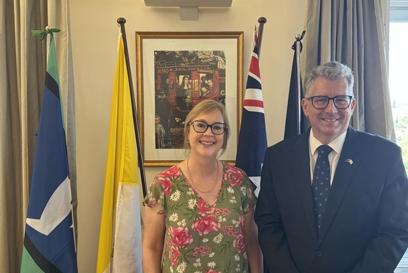A new campaign from Caritas Australia seeks to upgrade run-down health centres in Papua New Guinea, giving women a safer place to give birth. 580 women die from birthing complications each year in Papua New Guinea, with 9 out of 10 of these deaths being preventable. Giving birth at home contributes to this mortality rate but is a symptom of rural health centres being in dire need of improvement.
87 percent of people in Papua New Guinea live in rural areas and are often hundreds of kilometres away from larger district hospitals. Most people rely instead on rural health centres, many of which have received limited upgrades since the 1980s.
For expecting mothers this means making the choice between giving birth at home without medical assistance, or attending a health centre that lacks reliable electricity, clean running water, watertight roofing and working medical equipment. The condition of these health centres also impacts the availability of doctors in rural areas, with just seven doctors trained to deliver comprehensive healthcare in these challenging settings.
This campaign aims to raise $30,000 by the 30th of November to support upgrades at six health centres in rural Papua New Guinea.
During a visit to one of these health centres earlier this year Caritas Australia heard firsthand how serious complications can arise. Travelling with one of those seven doctors, Dr Athanasius Kari, Caritas Australia learnt of a recent lifesaving intervention at a health centre in Aitape.
Just prior to the trip Dr Kari had been in Aitape visiting a health centre and his flight home was cancelled. This turned out to be a lifesaving turn of events, as later that evening a woman got into difficulty while delivering twins. Dr Kari was thankfully still in the area and able to return to the health centre to perform an emergency caesarean.
Without this the mother would have faced hours on the road and a journey by boat to reach a district hospital for assistance, something she and the twins may not have survived. The health centre in Aitape had also recently had water tanks and off grid energy installed making it a suitable place for this mother to give birth, which played its own part in ensuring she got the medical assistance she needed.
Nicole Chehine, Acting Advancement Director at Caritas Australia who travelled with Dr Kari said, “The health centre I visited in Lemakot was having work done on the roof, which was full of holes having last been attended to in 1987. The centre had been operating without running water or electricity, and with its equipment in dire need of replacement.”
“The staff there are wonderful, but it is unsurprising that women choose to give birth at home rather than at a health centre that relies on torches and water buckets. There are six health centres in Papua New Guinea with similar issues that need our support and your generosity.”

















